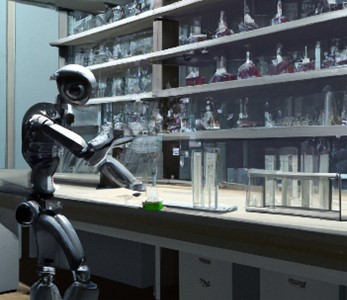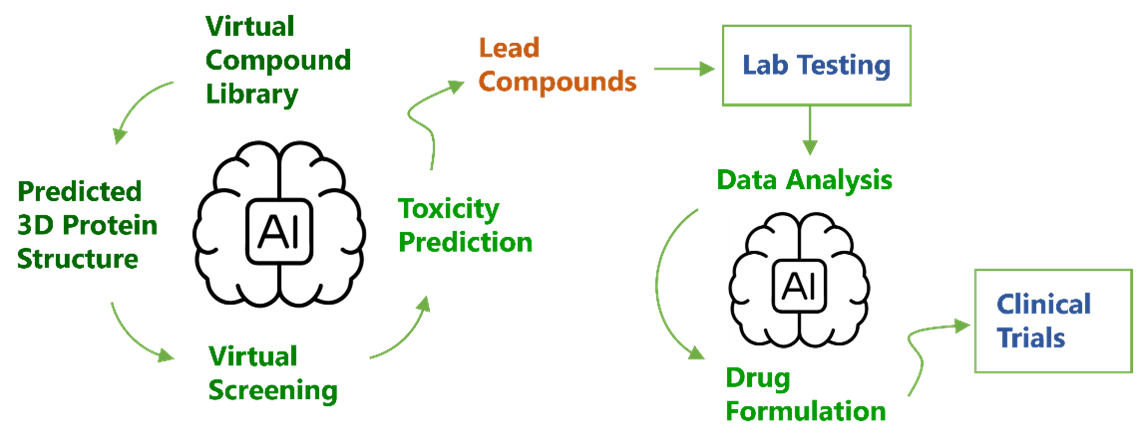Artificial Intelligence (AI) in Drug Discovery
Introduction

AI (Artificial Intelligence) is revolutionizing the field of drug discovery, offering innovative solutions to accelerate the development of new pharmaceuticals. This technology harnesses the power of machine learning, deep learning, and data analytics to streamline various aspects of drug development, from target identification to clinical trials. In this Tech Note, we will explore the significant contributions of AI in drug discovery.

AI (Artificial Intelligence) is revolutionizing the field of drug discovery, offering innovative solutions to accelerate the development of new pharmaceuticals. This technology harnesses the power of machine learning, deep learning, and data analytics to streamline various aspects of drug development, from target identification to clinical trials. In this Tech Note, we will explore the significant contributions of AI in drug discovery.
Target Identification and Validation
By analyzing vast datasets of biological information, AI algorithms can identify potential drug targets more efficiently than traditional methods. This enables researchers to focus their efforts on molecules that are more likely to succeed, saving time and resources. AI-driven predictions also help researchers better understand the underlying biology of diseases, paving the way for more targeted therapies.

Fig. 1. Inputs and output criteria for AI in therapeutic target identification. Adapted from Pun F. et.al. 2023 (1).
Drug Design Process
AI accelerates the search for novel compounds by predicting their biological activity and toxicity. AI-driven drug design tools can generate virtual libraries of molecules, allowing researchers to explore a wider range of chemical structures and identify promising drug candidates faster. This not only expedites drug discovery but also reduces the costs associated with experimental trial and error. Specifically, there are three main areas in which AI can be leveraged to accelerate discovery: virtual screening, generative chemistry, and toxicity prediction.
Virtual Screening: AI-driven virtual screening is a critical component of drug design. Traditional drug discovery involves experimentally testing thousands of chemical compounds for their potential as drug candidates. This process is time-consuming and expensive. AI, however, can predict the biological activity of molecules through machine learning models trained on vast datasets. For example, Google's DeepMind developed AlphaFold, an AI system that can predict the 3D structure of proteins with remarkable accuracy (2). This information is invaluable in understanding how potential drug candidates interact with target proteins, allowing researchers to design molecules more effectively.
Generative Chemistry: AI can generate novel chemical compounds with desired properties. Companies like Insilico Medicine use generative models to create virtual libraries of molecules (1). These AI algorithms explore chemical space, generating thousands of potential drug candidates. Researchers can then analyze these candidates to identify those with the most promising properties, reducing the time and cost required for lead compound discovery.
Toxicity Prediction: Assessing the toxicity of potential drug candidates is a crucial step in the drug development process. AI models can predict toxicity based on chemical structure and biological data. This helps prioritize compounds that are less likely to have safety issues during clinical trials (3).
Drug design often involves balancing multiple objectives, such as efficacy, solubility, penetrance, safety, and cost. AI can optimize these multi-dimensional trade-offs more efficiently than manual human curation. One example is the use of reinforcement learning algorithms to optimize drug formulation. This can lead to the development of combination therapies or drug delivery systems that enhance the overall effectiveness of treatments.

Fig. 2. Touchpoints where AI can enable the drug design process indicated with green text.
Clinical Trials
While not strictly part of drug design, AI also influences the design of clinical trials. AI algorithms can analyze patient data to identify suitable candidates for trials, predict patient responses, and optimize trial designs. This ensures that clinical trials are more efficient, have higher success rates, and result in safer and more effective drugs reaching the market more quickly. Adaptive trial designs use AI to continuously analyze accumulating data to make real-time adjustments to the trial protocol. This approach can increase the probability of success and reduce the time and cost of clinical trials. One example is the I-SPY 2 trial in breast cancer, which uses AI to adapt patient treatment arms based on ongoing data analysis (4).
Drug Repurposing
The process of finding new therapeutic uses for existing drugs can be implemented with AI. By analyzing vast amounts of data, including clinical records and molecular profiles, AI can identify drugs with potential applications in different diseases. This approach can significantly shorten the time it takes to bring a drug to market, as the safety profile of repurposed drugs is already established.
Drug Manufacturing and Quality Control
AI-powered systems can monitor and optimize manufacturing processes, ensuring consistent drug quality and reducing production costs. Additionally, AI can assist in identifying and addressing quality issues early in the manufacturing process, reducing the likelihood of recalls and improving patient safety. Some examples include AI-driven process controls that can adjust parameters like temperature, pressure, and mixing rates, predictive maintenance of equipment, AI-powered inspection systems to detect defects, impurities, or irregularities, data analytics to optimize efficiency, reduce waste, and improve overall quality and AI-driven supply chain management.
Personalized Medicine
AI in drug design extends to personalized medicine. By analyzing patient data, including genetics and clinical history, AI can identify patient subgroups that are more likely to respond to a specific drug. This precision medicine approach minimizes adverse effects and increases treatment efficacy. For example, the Cancer Genome Atlas (TCGA) project uses AI to analyze genetic data from cancer patients to guide personalized treatment choices (5).
Conclusion
AI is transforming drug discovery by expediting target identification, streamlining drug design, optimizing clinical trials, facilitating drug repurposing, and improving drug manufacturing and quality control, while enabling personalized medicine. These advancements hold the promise of bringing safer and more effective drugs to market faster, benefiting patients worldwide and revolutionizing the pharmaceutical industry. As AI technologies continue to evolve, their impact on drug discovery is likely to grow, making them an indispensable tool in the quest for innovative therapies.
BPS Bioscience supports AI-driven companies by providing contract research services including custom protein/antibody and assay development, screening and profiling services, and custom cell line or lentivirus/AAV production for research. Our extensive experience supporting research has enabled drug discovery for many top pharmaceutical and vaccine companies worldwide.
References
(1) Pun F., et.al. 2023. Trends Pharmacol Sci. 44:561. Pubmed
(2) Jumper J., et.al. 2021. Nature. 596:583. Pubmed
(3) Cavasotto C. and Scardino V. 2022. ACS Omega. 7:47536. Pubmed
(4) Wolf D., et.al. 2020. NPJ Breast Cancer. 6:48. Pubmed
(5) Wang Z., et.al. 2016. Methods Mol Biol. 1418:111. Pubmed

